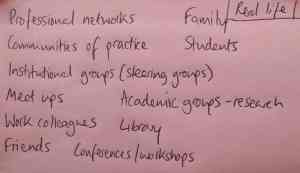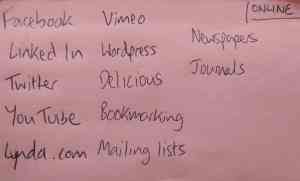So, that was a very inspiring trip, especially to get back some focus on my personal research. The very best part of course, was meeting the many new and interesting people – so thank you so much for the conversations, #altc community! This post is on the results of the workshop “How do you break your Filter Bubble?” on the topic of Filter bubbles and Personal Learning Networks that I held at ALTC. I’m going to write a more detailed reflection on the conference itself, so look out for that post very soon.
This was a very lively workshop. I know you shouldn’t say that as the organiser, but when I submitted the idea, I mainly wanted to start a debate on the filter bubble (or the term “echo chamber” – as I learnt – is more generally used in the UK) and the problems it poses for learning and personal learning networks. It seems that this topic speaks to many as I had some interesting reflections and conversations on it, before and during the workshop. During the workshop we had 9 participants and decided to split up into 2 groups. Below I have tried to report the results of the discussion on each of the points, and added some of my commentary in italics.
Some general notes
I learnt that the filter bubble need not necessarily be something negative, as it provides comfort, and a safe space to articulate your views, without fear of being attacked for them. So there is certainly a need for the filter bubble in some cases. The issues comes when your filter bubble intervenes with your learning or real view on the world.
Because isn’t the nature of learning, that you need to be out of your comfort zone, so that you learn?
On Diversity in a Personal Learning Networks
The determinants of diversity in PLNs was the issue that drew most discussion, as it was deemed by many that diversity is difficult to label.
Some determinants noted were things like : education, class, aggression, funding, ease of access, interests, advertising revenue, cultural perspectives/aspirations and government intrusion into services, and chances of serendipity. The core understanding was that “ideas were different from people.“
Also, sometimes the effects of filtering can also bring unexpected/non-deliberate diversity in your bubble. e.g. because you choose to follow people with whom you only share one well-defined interest (for example, a hobby), you might actually get in touch with people who have diverse views from yours.
It was also noted that filter bubbles are not necessarily online phenomena, but also offline/in real life, we have systems that reduce the connections we can make. The items that make up diversity in these two areas are illustrated here.


I was very glad to read the quite wide range of determinants that were noted down. I would invite the participants to comment further on them and maybe explain them in more detail as a comment to this post. What amused me about the discussion was the fact that this discussion again showed the limitations of our technologies. Although it seemed artificial to pinpoint what could be a determinant of diversity in your network, ultimately technology does exactly that, as it has only uses limited types of measures and data available to take decisions on what to show you, the user.
On discovering that you are in a filter bubble
The participants agreed that most often we notice that we are in a filter bubble after getting a shock of some sort. Many shared their experiences on the discovery of 2016’s Brexit vote and the 2016 US Elections, and how “they had not seen it coming”.
It is interesting, that we seem to find out we are in a filter bubble when something unexpected happens – that does not fit in with what you think the world looks like. I wonder if we need this kind of ‘shock’ effect, to start re-assessing our understanding, but also to review the limitations of our perspective (and the things that determine our perspectives). This reminds me of concepts of breakdown and rebuilding and negotiating understanding (http://gerrystahl.net/cscl/papers/ch14.pdf)
So what can we do about it?
Our Behaviour
How can we deal with filter bubble?
- listen to multiple sources
- be curious
- look for serendipity
- seek/look for/follow other points of view – in a safe way (e.g. through private browsing)
- consider using second accounts
- re-skin your bubble (this is very intriguing – any explanations/elaboration from the workshop participants?)
How can we teach our students to deal with their filter bubble?
- train digital literacies
- teach students to evaluate credibility
- take them on “guided tours” outside the safe spaces of the VLE/LMS/etc. Work with them in the open spaces of social media, but provide support through collaborative reflection, giving context, etc.
Core message: “I can gain most from my PLN WHEN I triangulate against others”
Technical Wishes
Here are some ideas the participants came up with for technical support that could help users with their filter bubbles.
These tools & instruments can help me manage my PLN effectively:
- Option to pay to not be included. if you aren’t paying, then you are the product.
- “Challenge me” button
- Avoiding paid-for adverts
- “Be someone else for the day” button – change your gender in your filter bubble
- “Forget me temporarily” button
- Try new things/new perspectives
- Random search button “I feel lucky”
- Awareness and how it works
- Comparing my search results with someone else’s or the results obtained when I’m not logged into the browser on a different network
- Missing information you would choose to accept (*comparison to peer; *presented different information)
The debate does not end here: please do add your comments/thoughts/opinions/ideas below!

